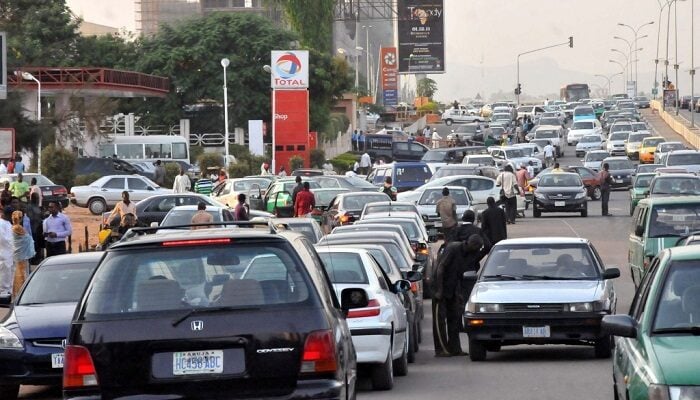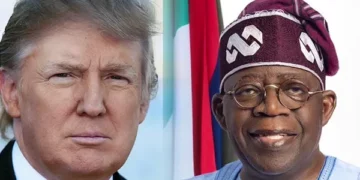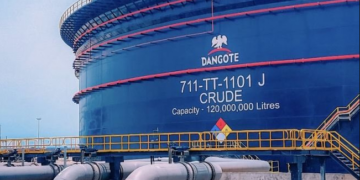As the Nigeria Union of Petroleum and Natural Gas Workers (NUPENG) gears up for a strike on Monday, there are fears of queues returning due to the anticipated fuel shortage.
The industrial action is in response to the Dangote Refinery’s refusal to allow imported Compressed Natural Gas truck drivers to join any trade union.
NUPENG president, Comrade Williams Akporeha and general secretary Afolabi Olawale, issued a statement asserting that the Petroleum Tanker Drivers Branch of the union will halt the movement of petroleum across the nation.
They also distanced the union from comments by Barrister Enoch Kanawa, president of the Direct Trucking Company Drivers Association (DTCDA), who claimed that NUPENG does not represent tanker drivers.
NUPENG characterised the DTCDA as a management creation designed to undermine the union’s authority, insisting that it is the only legally recognised body for tanker drivers.
They challenged the legitimacy of the DTCDA, pointing out that its president is a lawyer, not a driver, and underlined the connection between DTCDA and the Dangote Group.
The union denounced the “slavish conditions” imposed by Dangote Refinery and called for public support against such oppressive practices. They urged members and the public to ignore the DTCDA and reaffirmed their commitment to solidarity and workers’ rights within the industry.
Retailers Back NUPENG Strike, Suspends Product Lifting Tuesday
Petroleum products retailers nationwide have declared their support for the impending strike by NUPENG.
On Saturday, the group announced a three-day suspension of lifting and dispensing petroleum products, starting Tuesday, September 9, 2025.
PETROAN’s national president, Dr. Billy Gillis-Harry, said their move is aimed at protesting against monopolistic threats, particularly from the aggressive business strategies of Dangote Refinery, which, he warned, could devastate smaller players such as private depot owners, modular refinery operators, marketers, and transporters.
Dr. Gillis-Harry warned that such dominance threatens widespread unemployment and economic instability, drawing parallels to previously adverse outcomes in Nigeria’s cement industry.
The association called on President Bola Ahmed Tinubu, the minister of state for petroleum, and other security and regulatory agencies to intervene immediately, even during their vacations, to prevent the looming disruption. He also clarified that since pump attendants at PETROAN stations are registered NUPENG members, the union’s strike would lead to the absence of petrol attendants.
It, however, mandated station owners to refrain from sacking employees during the strike period.
According to him, PETROAN held emergency consultations and resolved on compliance measures, including deploying a 120-man watchdog team to protect member facilities during the shutdown.
The association reaffirmed its commitment to fostering healthy competition, promoting sector stability, and protecting the livelihoods of millions relying on the oil and gas economy.
Dr. Gillis-Harry called on President Tinubu, minister of state for petroleum (oil), the Group CEO of NNPC, the Authority chief executive of NMDPRA, the director-general of the State Security Service (DSS), and the Inspector-General of the Nigeria Police Force to intervene urgently in the proposed actions of NUPENG and PETROAN to avert potential hardship and pain on citizens arising from the suspension of lifting and dispensing of petroleum products.
He also appealed to the president to find a solution to the crisis, to ensures the smooth operation of the oil and gas sector and minimising disruptions to the nation’s economy.
PETROAN had earlier advocated a healthy competition in the oil and gas sector, as opposed to monopolistic tendencies.
Dr. Harry stated that Dangote Refinery’s aggressive business strategies would have far-reaching consequences, including driving out private depot owners, modular refinery operators, marketers, retail owners, truck owners, and truck drivers.
This, he warned, would trigger millions of unemployed nationwide, with devastating effects on the economy and the livelihoods of Nigerians.
Harry advised Nigerians to view any initial strategy aimed at gaining monopoly as a “Father Christmas” promise, cautioning them not to forget the events that unfolded in the cement industry.
He urged Nigerians to be vigilant and not be swayed by promises that may seem beneficial in the short term but could have long-term negative consequences.
He revealed that PETROAN had held an emergency ordinary national general meeting, at which it resolved to hold consultations on Sunday and Monday in a bid to mediate on the proposed shutdown.
“In the event of no fruitful outcome, the PETROAN Congress agreed not to sack any employee who participates at all retail outlets nationwide by the early hours of Tuesday.
“To enforce this decision, a 120-man compliance team will be mobilised as watchdogs to ensure the safety of our member’s facilities.
“As a critical player amongst stakeholders, PETROAN will join other stakeholders in ensuring healthy competition in the oil and gas sector of Nigeria. This collaborative effort aims to promote a conducive environment for workers, foster sector growth, and ultimately benefit the Nigerian economy.”
FG Meets NUPENG, Dangote Group Today Over Face-off
Meanwhile, the federal government has waded into the brewing face-off between the National Union of Petroleum and Natural Gas Workers (NUPENG) and the Dangote Group, appealing to the union to suspend its planned nationwide strike, which is scheduled to begin today, September 8, 2025.
Minister of Labour and Employment, Muhammad Maigari Dingyadi, yesterday confirmed that he had summoned all parties to a conciliation meeting in Abuja today.
The move followed rising tensions over Dangote Group’s alleged policy against the unionisation of its workers.
According to a statement issued by the ministry’s head of information and public relations, Patience Onuobia, Dingyadi urged NUPENG to rescind its decision to shut down operations in the petroleum sector and appealed to the Nigeria Labour Congress (NLC) to withdraw the “red alert” it issued to its affiliates in solidarity with the oil workers.
“I have invited all the parties to a conciliation meeting. Since I have intervened, I plead with NUPENG to rescind their decision to shut down the petroleum sector starting\ tomorrow.
“I also appeal to the NLC to withdraw the red alert it issued to its affiliate unions to be on standby for a nationwide strike,” Dingyadi said.
The minister warned that industrial action in the petroleum sector would trigger widespread hardship across the country and inflict heavy losses on government revenue.
“The petroleum sector is very important to this country. It constitutes the core of the country’s economy. A strike in the petroleum sector, even for just a day, will have an adverse impact. It will not only lead to revenue losses running into billions of naira but also cause untold hardship for Nigerians,” he cautioned.
He also called on all stakeholders to allow peace to prevail, assuring that government will broker a resolution acceptable to both labour and the company.
“The matter will be resolved amicably to the satisfaction of all the parties involved,” he said.
Strike: ERA Condemns NUPENG, NLC Over Threat To Cripple Nigeria’s Economic Life
The Economic Rights Agenda (ERA) has strongly condemned the Nigeria Labour Congress (NLC), the Nigeria Union of Petroleum and Natural Gas Workers (NUPENG), the Petroleum Products Retail Outlets Owners Association of Nigeria (PETROAN), and other affiliated unions for their planned nationwide strike.
According to ERA, the strike, if carried out, will disrupt fuel distribution and cripple Nigeria’s economic life.
ERA’s executive director, Dr. Josiah Inuwa, at a briefing in Abuja, described the proposed industrial action as a “reckless and unpatriotic” assault on the Nigerian people, warning that it would inflict severe hardship on millions while potentially serving the interests of economic saboteurs.
Dr. Inuwa argued that the strike would primarily harm ordinary citizens—small business owners, transport operators, and families—rather than corporate giants.
“The okada rider in Enugu, the pepper seller in Osun, the teacher in Kaduna, and the mechanic in Port Harcourt will bear the brunt,” he stated. “Transport fares will skyrocket, food prices will soar, hospitals will lose power, and small businesses will collapse. This is not a fight for justice—it is a direct attack on the Nigerian people.”
ERA highlighted the devastating impact of past oil sector strikes, such as the 2012 fuel subsidy protests and the 2020 industrial actions, which cost the economy billions of naira daily and deepened recessionary pressures.
The group warned that the proposed strike could trigger similar losses and threaten Nigeria’s fragile economic recovery under President Tinubu’s reforms.
Dr. Inuwa raised concerns about the strike’s timing, noting its alignment with efforts by vested interests to undermine Nigeria’s push for energy self-sufficiency through the Dangote Refinery, a critical step toward ending decades of reliance on imported fuel.
“Whether knowingly or not, NLC, NUPENG, and PETROAN risk becoming pawns of cartels that profit from the status quo,” he said, accusing these groups of orchestrating sabotage to derail the refinery’s success.
The ERA also accused union leaders of hypocrisy, pointing to the disconnect between their public rhetoric and private privileges.
“Many of these leaders drive in convoys while the masses trek,” Dr. Inuwa remarked. “They negotiate secret deals behind closed doors while claiming to fight for justice in public squares.”
He also criticised the unions for bypassing civilised dispute resolution mechanisms like arbitration and dialogue, instead resorting to “blackmail” that holds the nation’s fuel supply hostage.
“Why choose to strangle a fragile economy at its jugular?” he questioned. “This approach is reckless and unacceptable.”
ERA demanded that NLC, NUPENG, PETROAN, and other unions immediately suspend the strike and return to the negotiation table to resolve grievances through dialogue.
They urged President Tinubu, the Ministry of Labour, and relevant agencies to stand firm against union pressure while facilitating constructive engagement.
The group also called on Dangote Refinery to transparently address worker concerns regarding unionisation and labour conditions, balancing its role as a strategic national asset with fair labour practices.
Additionally, the ERA urged the National Industrial Court and the Department of State Services (DSS) to establish mechanisms to deter irresponsible strike threats that weaponise critical sectors like oil and gas.
They appealed to the National Assembly to summon all parties involved to ensure transparency and investigate potential sabotage by cartels profiting from Nigeria’s fuel import dependency.
Addressing Nigerians directly, Dr. Inuwa called for vigilance against manipulation by “empty rhetoric,” emphasising that the strike threat is not a noble struggle but a calculated move for control and monopoly.
“This is not about workers’ rights—it is about sabotage,” he warned.
“Praising President Tinubu’s economic reforms as deliberate steps toward recovery, he cautioned that such progress is too fragile to withstand another disruption.”





